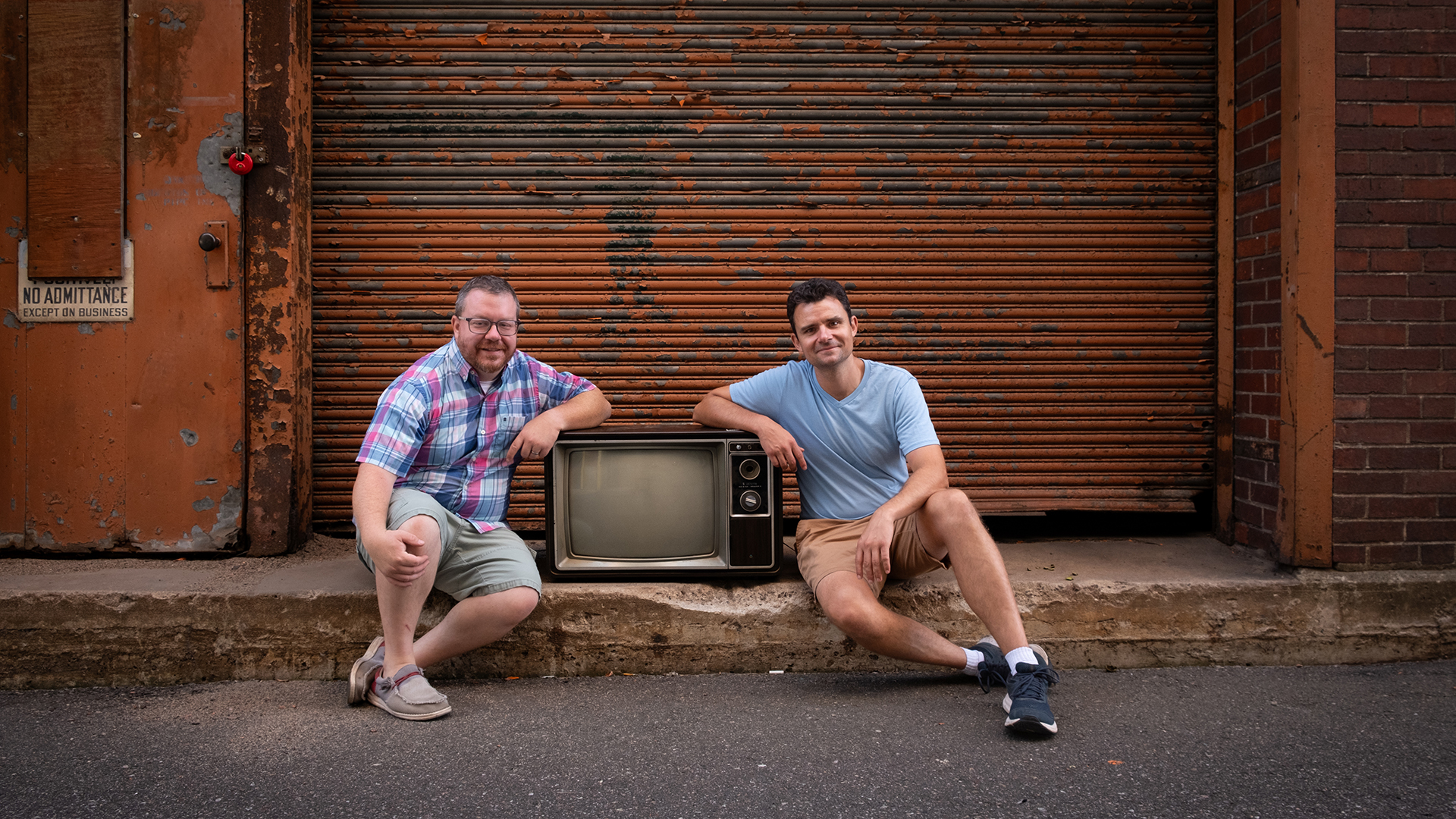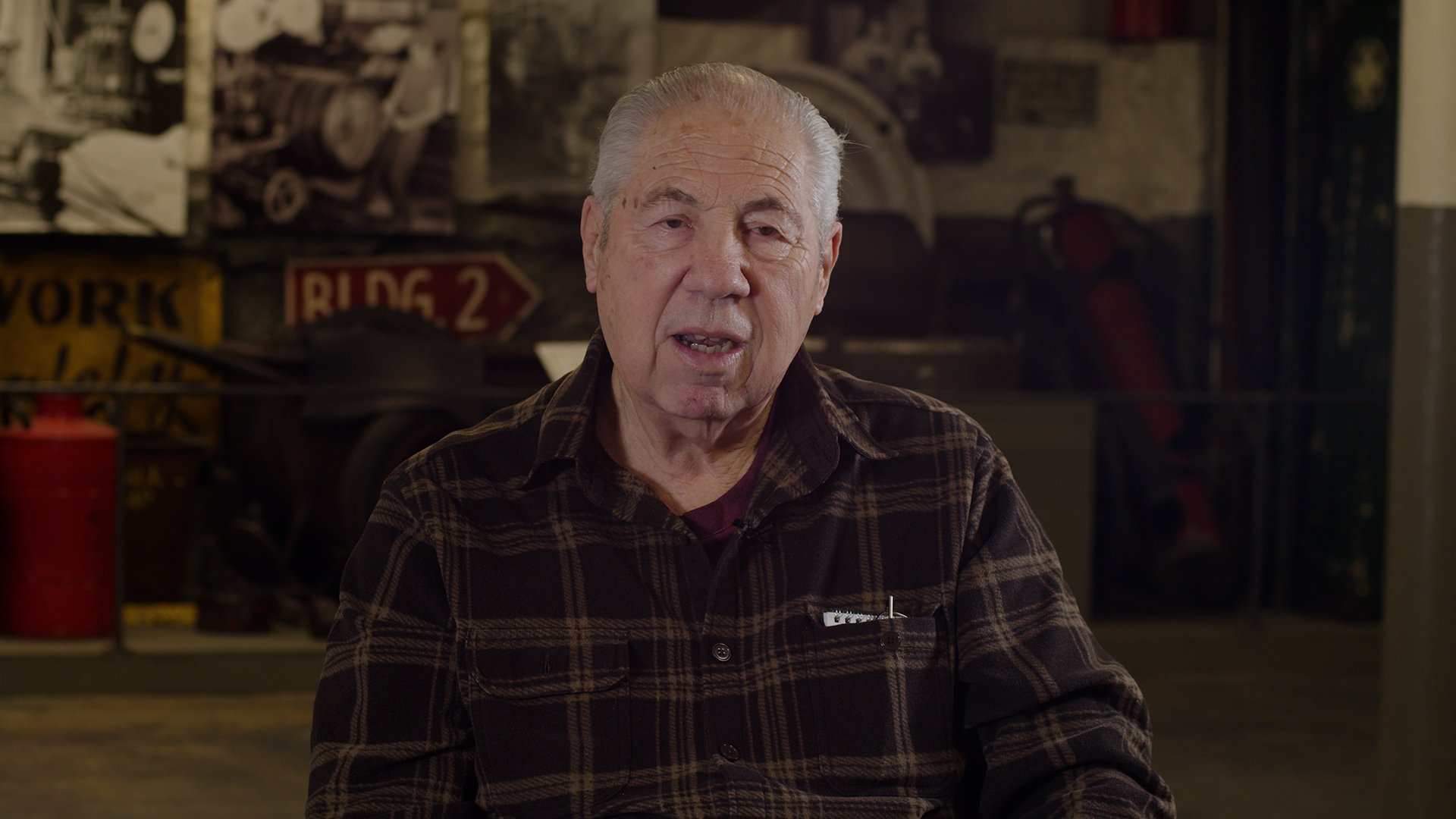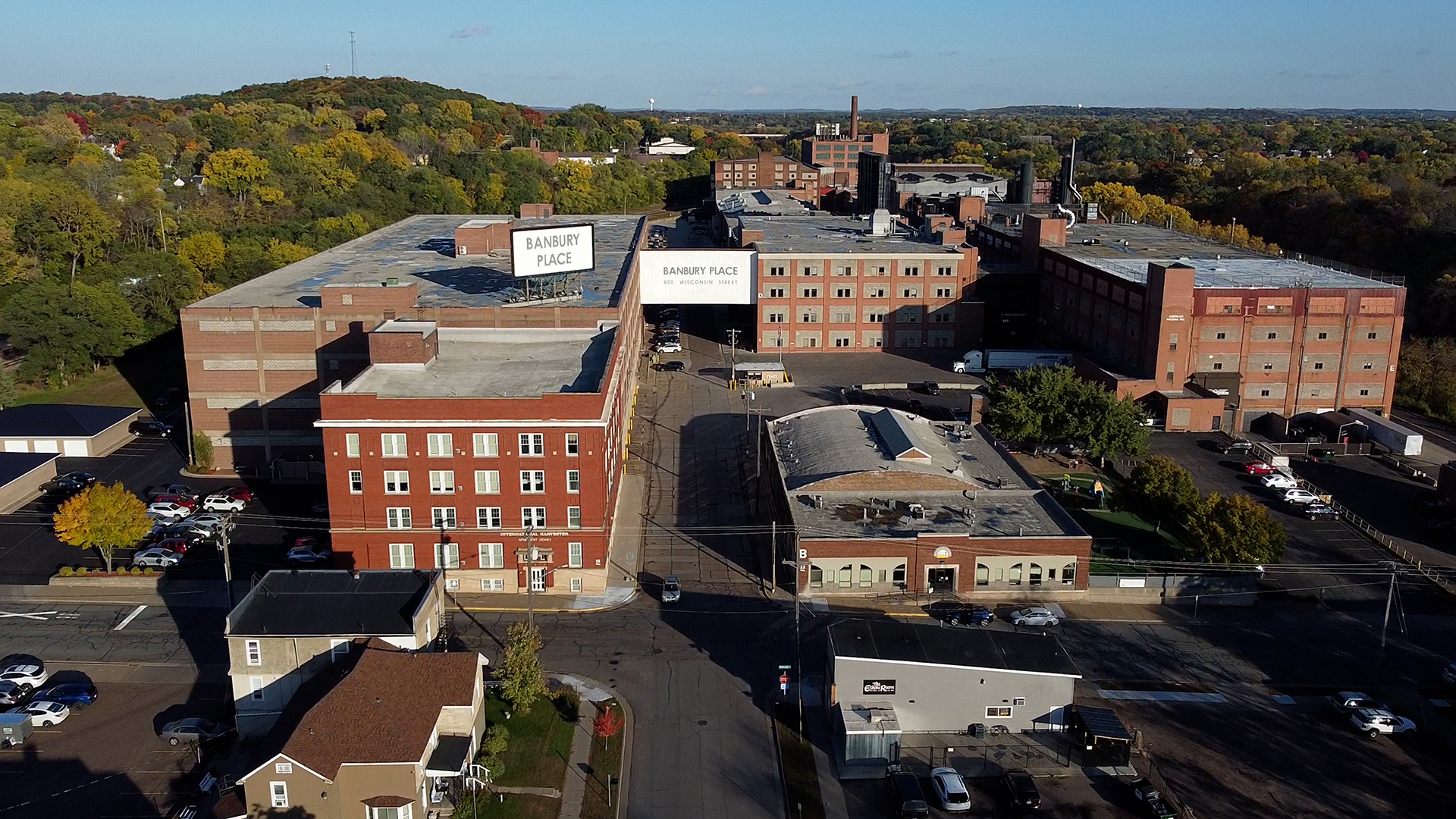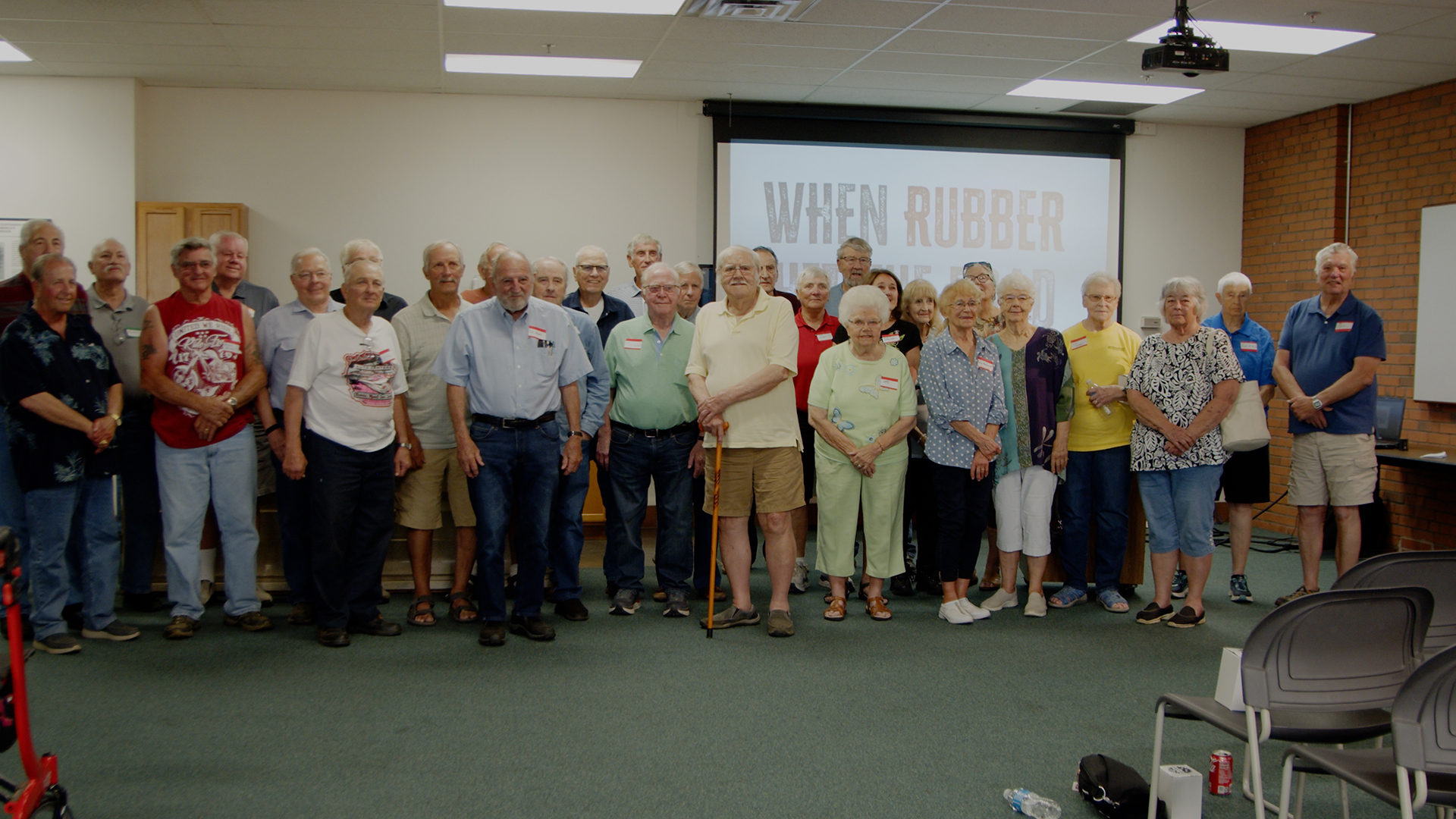More than three decades after the closing of Eau Claire’s Uniroyal tire plant, PBS Wisconsin and Fireside Productions will explore the rise, fall and legacy of western Wisconsin’s tire industry and the reinvention of its employees and city in When Rubber Hit the Road.
In January 1991, Eau Claire’s Uniroyal tire plant employees received devastating news: After 75 years of manufacturing tires, the plant was scheduled to close. As the city struggled to overcome the loss of its largest employer, more than 1,300 former employees struggled to find their footing in a quickly changing world. What would happen next was anyone’s guess. But if the city hoped to survive, it was up to its citizens to figure out how.
When Rubber Hit the Road is more than a story about tires. It’s the story of a Midwestern city’s attempt to reinvent itself in the wake of America’s manufacturing decline. It’s a blueprint, too, for how a community can bounce back when people commit themselves to embracing change.
The film is produced by Fireside Productions LLC. Founded in 2023 by Hollars and Steve Dayton, Fireside Productions LLC strives to elevate and amplify stories that could only happen in the heartland of America. They are driven by a passion for narrative excellence and a commitment to showcasing the vibrant, captivating and often overlooked stories that define the Midwest.
When Rubber Hit the Road premiered May 20, 2025, on PBS Wisconsin and is available to stream online and on the free PBS app. It won a 2025 Upper Midwest Emmy award for historical documentary.
PBS Wisconsin spoke with the filmmakers about their motivations for telling this story, the research and interviews they conducted, and the unique challenges and insights they gained throughout the filmmaking process.
P.S. Do you have a connection to the former Uniroyal tire plant? Share it in the comments section at the end of the article!
PBS Wisconsin: Why did you decide to tell this story?
B.J. Hollars: Steve and I spent a lot of time hanging out by the backyard campfire at his house, and for years we would kind of pitch each other these ideas. I’m sort of the writer researcher, he’s very much the film guy. We were always looking for a story that we thought we could showcase together about our region. And when it comes to those stories, there’s really nothing in the region bigger, certainly economically, than the closing of the Uniroyal plant. This happened sort of long before our time in Eau Claire, but Steve will tell you he’s got some family members connected to that. And every time we drive by Banbury [Place, in the former Uniroyal plant], for years, I was just so curious: What’s the story there?
Steve Dayton: I’m originally from La Crosse, so coming to Eau Claire and driving past Banbury Place, it always intrigued me. And then I got a job at Royal Credit Union that was actually formed and started in the Uniroyal tire plant. I kind of knew a little bit about that. And my wife’s grandfather actually worked at Uniroyal, so I had heard stories, but when B.J. and I were talking about it, he’s like, this story just hasn’t been fully told the way that he knew that we could do it, and that’s what motivated us to do it.

Filmmakers Steve Dayton and B.J. Hollars.
PBS Wisconsin: Why were you in a unique position to tell it?
Hollars: We are not tire workers. We didn’t really know it as intimately as many people did. We weren’t even part of that community at the time. But our university has some incredible resources, archival resources. A lot of the folks from that era are still alive and well in this community, and they want to talk. And so we kind of made it our mission to knock on some doors and go through some archives and try to find the story one last time and tell it by way of the people who survived it.
PBS Wisconsin: Creating this documentary involved extensive archival research and many interviews with Eau Claire residents and former Uniroyal employees. What was your entry point?
Hollars: Dennis Miller is a former tire plant employee, an electrician who worked there for years and years, and he’s kind of become sort of the bard of the story, an electrician with a heart of an artist. For years he’s been doing these kind of documentaries pretty much on his own, writing some books, all kinds of ways to try to capture this moment in history. So I just kind of befriended the guy, and we got to talking.
Just like with writing a nonfiction book, one person leads you to the next person who leads to the next person. The stories begin to kind of converge. And that’s that beautiful thing when you start to realize that these aren’t just individual people you’re talking to. They are all people on the same line making the same product sometime 30 years ago. Part two was spending a lot of time in the UW-Eau Claire special collections and archives with [UW-Eau Claire head archivist] Greg Kocken. There are over 30 linear feet of boxes to go through.

Former Uniroyal electrician Dennis Miller.
PBS Wisconsin: How did you navigate the strong feelings you encountered about the Uniroyal closure when making this film?
Dayton: I think it was beneficial for us not to have so much attachment to the story itself so that we could come in with open eyes and tell the story how we unravel it, how it is. We tried to tell it as fairly and as evenly as possible, and we just tried to give as many Uniroyal workers a chance to share their story.
Hollars: The narrative that, prior to doing this documentary, I’d often heard was, the hardworking union did their best, but the big bad corporation came in and closed things down and destroyed the town. And I mean, it’s a lot more complicated than that. I credit all parties and everyone involved for helping us kind of see the complexities of that and to recognize that … I don’t think these decisions were taken lightly. It is still so emotionally wrought. I mean, they lost their jobs, they lost their livelihoods, a lot of times they didn’t have any other opportunities awaiting them if they kind of had a high school diploma and that was it. Retraining took a lot of time or you had to uproot their families. Lots of families were destroyed, lots of divorces, all of that. But I think even the tire workers were sort of surprised to learn the many steps that the other corporations did take to try to put off the decision as long as they could.
Dayton: That’s the unique thing about this story too, is that it isn’t just located straight in Eau Claire – all over the state, all over the country was this type of story.
PBS Wisconsin: This film is about both the fall of Uniroyal and the rise of the city as you know it today. What was the most important thing you learned telling this story?
Hollars: What I learned that was really important to my understanding of Eau Claire and my home now is, and it’s at the very end of the film, [former Eau Claire Leader Telegram Editor] Doug Mell talks about how it wasn’t easy, it wasn’t fun. This was a really bad thing for our city, but had it not closed down, we would not be the city we are today. We would not have diversified our economy. We are a much stronger city as a result of the pain that these people endured. And that is just a hard thing to get someone to say. It’s a hard thing for the tire workers to sometimes acknowledge, but gosh, I think people are really proud of where we are today. I hate that people got hurt along that path, but I’m also proud of the resiliency of the town.

The Uniroyal tire manufacturing plant was repurposed into Banbury Place, a multiuse complex.
PBS Wisconsin: Bringing manufacturing back to the United States is a big topic right now. Does your experience creating this film give you any unique insight into what you think that might look like in modern cities in Wisconsin and the Midwest?
Hollars: I’m no expert on these sorts of subjects, but what the documentary taught us, what all those tire workers taught us is that how you treat American workers matters and profits are important, but so is humanizing the people who are working the lines.
Dayton: They had a lot of pride in what they did. And one story that I always love to talk about is, when it closed down, there was a little bit of worry of workers destroying stuff and making it hard to sell or whatever, and there was nothing done because it was their plant. They took care of it, they had pride in it and they weren’t going to let it just be destroyed because of feelings.
PBS Wisconsin: What was your favorite part of making When Rubber Hit the Road?
Hollars: We were all very much odd couples. Here’s this college professor type over here and this media guy over here and a bunch of tire workers who are double our age. They invited us in, they may be a little leery at first, but they invited us in. They let us join them at all their rubberhead meetings in the garage, eating all their deer hunting stuff and all the cheese and crackers and coffee. And it was so educational just in an intergenerational way to hear them talk about the world today and what is different and how much they miss the collegiality and working together and how they just really don’t love this fractured life we are now living. Steve and I always joke right now, our places of work will try to have a once-a-year get-together and we sometimes show up, but these people have been meeting 30 years after the fact every two weeks just to socialize. Something has gone missing. Something is different in the modern workplace. The affection just doesn’t seem to be there in the same way. But gosh, they had it working really hard back in the Uniroyal days, that’s for sure.

Former Uniroyal employees gather for a screening of When Rubber Hit the Road.
PBS Wisconsin: What do you think younger generations might take away from this film?
Hollars: A few weeks ago, Steve and I had an opportunity to share this film with a group of undergraduate social workers on the University of Wisconsin-Eau Claire campus, and it was a very moving experience. So many of those students said things like, “I drive by that building all the time, and I never had any idea how important it was to the formation of our city.” There were other speakers there as well from the city, and they asked, “Well, how would you have helped this? How would you have people find their jobs? How would you have gotten them new educational opportunities?” And they were just really brainstorming and fired up to think of: What would we do if this happened again today? Which of course it has and it does – the healthcare system here in Eau Claire recently went through a very similar situation with HSHS [Sacred Heart Hospital]. Seeing them so fired up to do the work for the next generation, having watched what happened before, was just a really powerful experience for me.
PBS Wisconsin: How does it feel to have your film premiere on PBS Wisconsin?
Hollars: I’m over the moon. I think in our earliest conversations we kind of dreamed of, gosh, wouldn’t it be great if PBS Wisconsin could be a part of this? We couldn’t have asked for a better home for this film, and this was always meant to be, I think, regionally shared. This is not a unique story. These things have happened across Wisconsin and the Midwest. But I think what makes our story unique in some ways at least, is the quickness with which our city banded together and got around the same table and got on the same page to try to find a way through despite the difficulties they faced.
Dayton: It’s just an honor to be able to put it out there and have people watch it and react to it. A lot of times you’re not thinking about the outcome, you’re just trying to create a good piece of art or story. It brings me a lot of pleasure, and I just feel overjoyed when anybody says that they watched it or they get something from it.
 Passport
Passport










Karen Demaree
I taught Culinary Arts at CVTC. Several workers entered this program, along with many other programs. Most had a high school education that was many years old. They were leary about being with “kids” but their work ethics rubbed off on the others. It was great watching the interactions and how well the UniRoyal students came out on top.
Alyssa Beno
Thank you for sharing, Karen!
Marcie Bakker
I worked at CVTC in 1991 also.
The workers were afraid of being students, but they were great! Hard working and fun to be around.
Alyssa Beno
Thank you for sharing, Marcie! It’s interesting to hear about the opportunities that former employees pursued out after Uniroyal’s closure.
carl Quella
Great article!
Alyssa Beno
Thanks, Carl! Enjoy the film (if you haven’t already seen it)!
Sarah A Schenkat
Before the plant closed, there was a learning center set up in the former tire sales room in conjunction with the overall employee support and transition program. A number of organizations and agencies partnered to provide vocational rehab services. I was one of the teachers for CVTC in that program. Employees came in during off hours to refresh and expand their learning skills and knowledge to prepare for future training and/or employment. Computer skills, math, writing and GED work were the focus of many students. It was a pleasure to work with them.
Alyssa Beno
Thank you for sharing, Sarah! From the comments we’ve received, it’s clear Chippewa Valley Tech played an important role in supporting former Uniroyal employees. I’m enjoying hearing the personal connections our readers and viewers have with this part of Eau Claire’s history.
Prudy Stewart
My dad was the purchasing agent at US Rubber for many years. As kids, we had lots of fun playing on one of the giant inner tubes my dad got from the plant. Many of or neighbors worked there too. And my mom’s cousin was a telephone operator at the plant.
Alyssa Beno
Thank you for sharing your family’s connection with Uniroyal, Prudy!